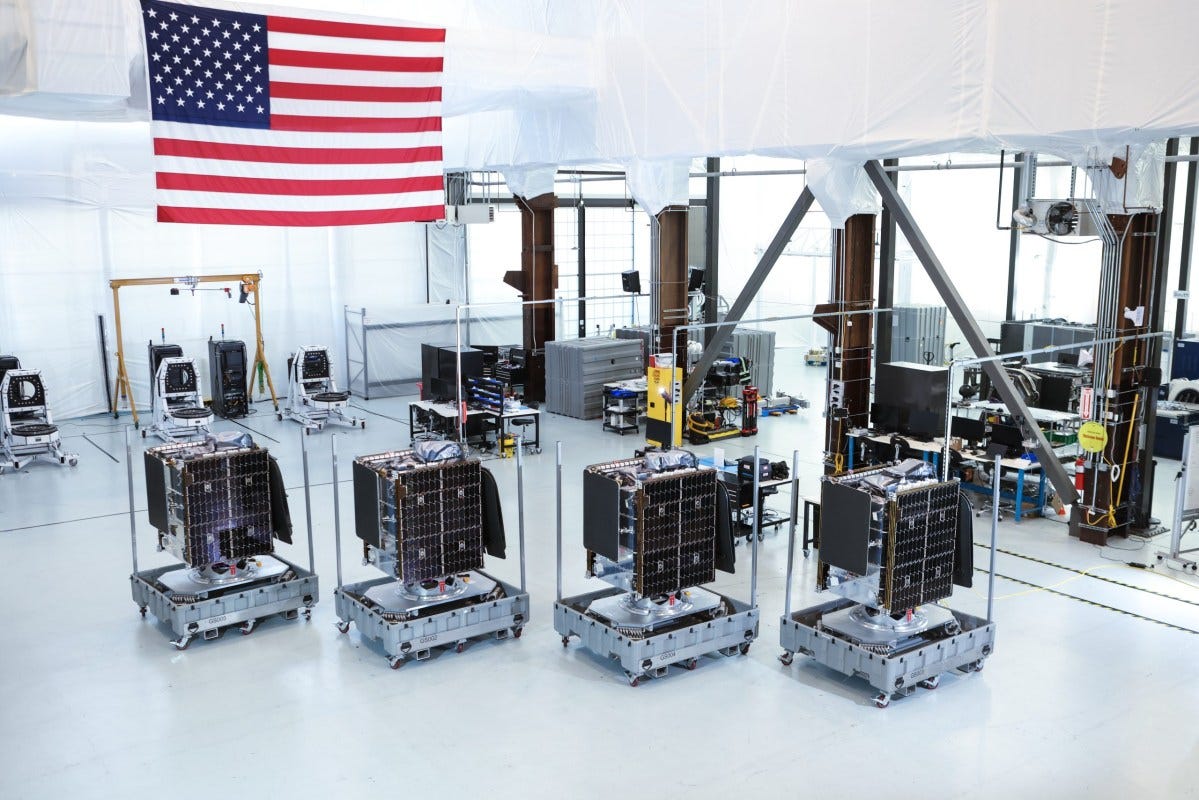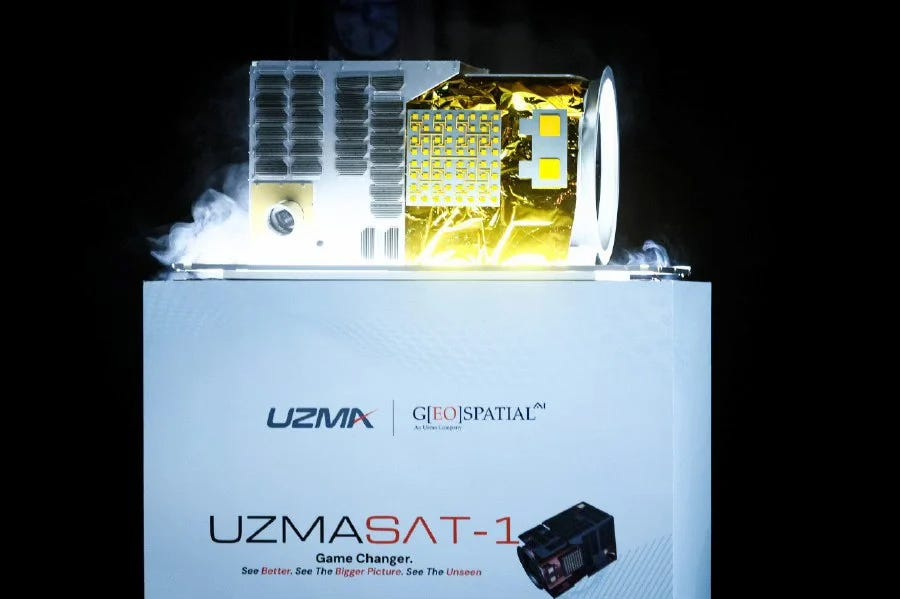Southeast Asia Space Roundup: 9 to 15 January 2025
A summary of all the space news in Southeast Asia over the past week, brought to you by AzurX
The following are the major space developments in the Southeast Asian region tracked by Southeast Asia Space Monitor over the past week:
Malaysia Space Developments
Malaysia’s UzmaSAT-1 Earth Observation Satellite Launched by SpaceX
Malaysia’s UzmaSAT-1, a high-resolution Earth observation satellite developed by local firm Uzma Berhad with support from Satellogic, was successfully launched into low-Earth orbit aboard SpaceX’s Falcon 9 Transporter-12 rocket. This milestone marks the 13th satellite under Malaysia’s supervision and demonstrates the progress of the country’s National Space Policy, implemented in 2023. Weighing 45.4 kilograms, UzmaSAT-1 will enhance monitoring operations critical to food security, national safety, and defense management. The launch aligns with Malaysia Space Exploration 2030 (MSE2030), which aims to transition the country from a space technology user to a creator by strengthening local capabilities and fostering innovation. This success highlights the growing role of local industry players in building a competitive and sustainable space sector, contributing to economic growth and advancing the national space ecosystem. The event underscores Malaysia’s commitment to developing a vibrant space economy and leveraging technology for national progress.

Thunder Match Appointed Authorized Retailer for Starlink in Malaysia
Thunder Match Technology Sdn Bhd, Malaysia's largest technology retailer, has been appointed an authorized retailer for SpaceX's Starlink satellite internet service. This partnership aims to address Malaysia's digital divide by delivering high-speed, low-latency broadband to remote and underserved areas through Starlink's constellation of low-Earth orbit satellites. Thunder Match, with its extensive network of 48 outlets and a strong online presence, is positioned to make Starlink accessible nationwide, empowering individuals and businesses with improved connectivity. The collaboration is expected to drive digital inclusivity, benefiting sectors like education, healthcare, and business operations in rural areas, while supporting Malaysia's broader digital transformation goals. This initiative reinforces Thunder Match's mission to provide transformative technology solutions that enhance quality of life and expand opportunities for underserved communities.
Experts: Malaysia Must Fastrack 5G Network Rollout, Including Satellite D2D
Malaysia’s ambitious rollout of a dual 5G network and the MyDigital ID program faces critical scrutiny from experts, who stress the urgency of a clear strategy and swift implementation to position the country as a regional digital leader and fulfill its Association of Southeast Asian Nations (ASEAN) chairmanship goals. Delays risk undermining Malaysia’s economic competitiveness, particularly as global tech firms have invested billions of ringgit (hundreds of millions of dollars) in local infrastructure to support cloud and AI services. Despite this, connectivity challenges persist, even in urban hubs like Kuala Lumpur, with users reporting subpar 5G coverage and reliance on outdated networks. Comparisons with global advancements, such as China’s breakthroughs in satellite-to-ground laser communications, underscore the need for Malaysia to accelerate progress. Additionally, unresolved issues with MyDigital ID integration, highlighted by disruptions like the postponed MyJPJ app link, have raised concerns about preparedness and user trust. Experts urge immediate action to address infrastructure gaps, fulfill consumer expectations, and ensure Malaysia’s digital initiatives align with its broader aspirations for technological leadership and economic growth.
Philippines Space News

Philippines’ Agila Communications Satellite Completes Initial Tests and On Its Way to Geostationary Orbit
Astranis has announced that all four of its newly launched Block 2 broadband satellites have completed initial tests and begun their journey to geostationary orbit using electric propulsion. These satellites, launched on 29 December 2024 via a Falcon 9 rocket, feature significant upgrades over the company’s debut spacecraft, Arcturus, which failed in 2023 due to solar array drive malfunctions. Block 2 incorporates advancements such as software-defined radios, a gimbal to extend operational life to at least eight years, and a reflector enabling 12 Gbps of Ka-band throughput. The satellites are set to provide regional broadband coverage: NuView Alpha and Bravo will serve inflight connectivity provider Anuvu across the Americas, Agila will deliver services in the Philippines for HTechCorp, and UtilitySat will initially support Mexico’s Apco Networks. Astranis plans to bring these satellites online by mid-2024 and is already preparing its Block 3 series, which includes a replacement for Arcturus and additional satellites for global operators. The company’s compact, 400-kilogram satellites represent a scalable and efficient alternative to traditional large GEO satellites, tailored for regional applications.
EU Copernicus Earth Observation Scholarship Open for Filipino Applications
The EU CopPhil Scholarship program, a component of the European Union's Copernicus initiative under the Global Gateway Strategy, is now open for applications. Targeting Filipino government professionals with geospatial expertise, the program offers scholarships to pursue advanced studies in Earth observation (EO) and remote sensing (RS) at leading European universities. With a financial package of up to €33,500, the program covers studies from September 2025 to July 2027, aiming to enhance the capacity of Filipino professionals working in digital earth disciplines. This initiative supports the EU’s €10 million Copernicus Philippines program, which focuses on adopting advanced EO technologies to aid disaster prevention, environmental protection, and resource management. Key projects include establishing a local Copernicus data center, piloting EO applications for monitoring land, marine environments, and ground motion, and promoting EO education. By fostering local expertise and strengthening bilateral cooperation, the scholarship contributes to the Philippines' sustainable development and digital transformation while addressing global challenges like green transitions and resilience to natural disasters.
Singapore Space Developments
Singapore’s Transcelestial Raises $24 Million for Deep Space Laser Communications
Rohit Jha, co-founder and CEO of Singapore-based Transcelestial, is transforming global internet accessibility with groundbreaking laser communications technology. Inspired by his passion for science fiction and a career in high-frequency trading that revealed the inefficiencies of fiber-optic networks, Jha launched Transcelestial in 2016. The company’s innovative approach replaces traditional fiber with wireless lasers, enabling faster and more cost-effective internet deployment. Its flagship device, Centauri, has been successfully tested in events like Coachella, and the company is developing a constellation of small satellites in low-Earth orbit to provide global connectivity. Backed by $24 million in funding from Airbus Ventures, Wavemaker, and In-Q-Tel, Transcelestial aims to bridge the digital divide and build communication infrastructure for deep space exploration, positioning itself as a key player in the future of telecommunications and space connectivity.
Germany’s Rivada Space Networks Appoints Chiun Maw Teo as APAC Sales Director in Singapore
Germany’s Rivada Space Networks has expanded its Asia-Pacific operations by appointing industry veteran Chiun Maw Teo as Sales Director APAC, based in Singapore. Teo will focus on delivering Rivada’s Outernet, a cutting-edge low-Earth orbit (LEO) satellite constellation that provides secure, high-bandwidth, low-latency global connectivity without relying on public internet or third-party infrastructure. Utilizing inter-satellite laser links and onboard processing, the network enables applications such as secure enterprise networks, enhanced oil and gas exploration, maritime connectivity, and 5G satellite backhaul. With Asia's growing need for resilient telecom infrastructure amidst geopolitical tensions and subsea cable vulnerabilities, the Outernet offers a transformative solution, aligning with regional digital strategies. Rivada’s CEO, Declan Ganley, emphasized its potential to revolutionize connectivity, while VP of Sales, Donald Chew, highlighted its appeal to Asia's connectivity providers, driven by a US$13.5 billion global market and expanding regional partnerships.
Other Regional Space News
Russia Offers Vietnam Collaboration on Satellite Technology
Vietnam and Russia continue to deepen their economic and trade ties, with bilateral trade volumes rising 8.3% in 2023 and a further 23.9% growth in the first ten months of 2024, despite global economic challenges. Deputy Minister of Russian Economic Development Vladimir Ilichev highlighted the expansion of multimodal logistics routes, positioning Hanoi and Ho Chi Minh City as key hubs for Russian access to Southeast Asia. Tourism has also surged, with Russian visitors to Vietnam up 84.9% and Vietnamese tourism to Russia benefiting from a 2023 e-visa system. Joint ventures such as Vietsovpetro’s oil achievements, GAZ Group’s vehicle assembly, and TH True Milk’s manufacturing expansion in Russia underscore the robust collaboration. Prospective areas for growth include pharmaceuticals, cosmetics, green energy, and digitalization, with Russian expertise in satellite technology, AI, and cybersecurity offering valuable synergies. Both countries aim to harmonize standards, reduce barriers, and foster innovation, while new working groups on IT and healthcare seek to bolster joint initiatives.
Laos Utilizes Satellite Imagery for Calculating Forestry Carbon Stocks
Laos is leveraging satellite remote sensing technology to calculate carbon stocks across 170,556 hectares of forest, marking a significant step toward establishing a carbon credit system with certification expected by Q3 2025. Led by the Ministry of Agriculture and Forestry in collaboration with Carbon Registry Thailand (CRT) and Carbon Credit Lao (CCL), the initiative enhances carbon accounting precision and fosters sustainable forest management. The project promises substantial financial and environmental benefits, enabling Laos to participate in global carbon markets, attract international investment, and channel revenues into community development, biodiversity conservation, and improved forestry practices. The initiative also explores extending satellite technology to agriculture, aligning with Laos' strategy to diversify its carbon credit portfolio and achieve carbon neutrality by 2050. With international partnerships and advanced methodologies, Laos is positioning itself as a regional leader in sustainable resource management and carbon credit innovation, setting a model for integrating technology and conservation for economic resilience.
Be sure to catch up with space activities in the region in the next edition of Southeast Asia Space Monitor’s space roundup!






